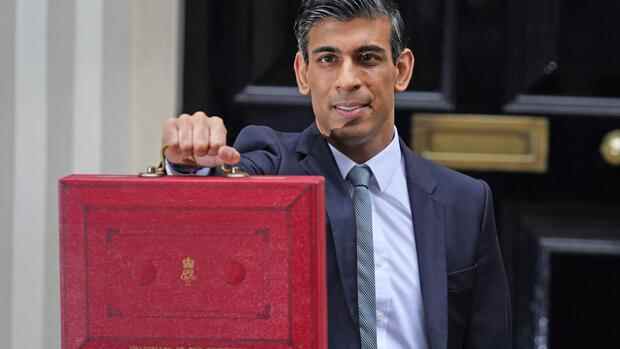London wants to support the domestic economy by spending billions.
(Photo: imago images / ZUMA Press)
London The UK supply crisis has dominated the headlines for months. Companies complain of acute labor shortages, delivery bottlenecks and rising energy prices. The conservative government of Prime Minister Boris Johnson is now pumping billions more into the economy to support the recovery from the corona pandemic.
In his budget speech on Wednesday, Finance Minister Rishi Sunak announced new spending in the tens of billions, including for infrastructure, investment promotion and the health sector. The research budget alone is expected to increase to 1.1 percent of economic output by 2025 – well above the OECD average of 0.7 percent.
Every ministry receives more money, Sunak proudly declared. On average, spending in this legislative period would rise by 3.8 percent per year in real terms. “The Conservatives are the real public service party.”
It is unusual for a Tory Treasury Secretary to show his enthusiasm for spending like this. In the pandemic, Sunak had already increased the national debt from 80 to 96 percent of economic output. But he sold the recent rain of money as an investment in the future. You are preparing the ground for a “new economy after Corona,” he said. “The growth is increasing, the number of jobs is increasing, our plan is working.”
Top jobs of the day
Find the best jobs now and
be notified by email.
Indeed, this year the UK is set to be the fastest growing economy of the leading industrial nations (G7). The budgetary authority on Wednesday raised the official growth forecast from four to 6.5 percent this year. However, the country also has the most to catch up: Last year the economy shrank by 9.7 percent. At the turn of the year, the pre-corona level should now be reached.
Inflation is becoming an increasing problem
However, there are still two risks: First, the acute shortages of materials and personnel are already slowing the upswing. Until recently, economists had expected growth of more than seven percent this year, but the recovery slowed in the third quarter. Companies are less optimistic than they were in the summer and expect the bottlenecks to continue until 2023.
A rate hike by the UK central bank could put a strain on his budget in the future.
(Photo: Getty Images)
From the coming year, social security contributions and corporate tax will also increase. This is compounded by the higher costs caused by Brexit, which will depress growth in the long term.
Second, inflation is also becoming an increasing problem. In September the rate of price increase was 3.1 percent. In the coming year it could rise to more than five percent, warned the chief economist of the Bank of England, Huw Pill, in the “Financial Times” last week.
The cost of living for the British is rising across the board: tariffs for electricity and gas were increased by twelve percent at the beginning of October. Gasoline prices hit a new record high this week. And food prices could also rise by five percent by Christmas, warns the chairman of the largest British supermarket chain Tesco, John Allen.
Inflation is a “challenge,” Sunak admitted. In the coming year it will average four percent. It will take months for the pressure from supply bottlenecks and energy prices to subside, he said. To cushion the rising cost of living, the Chancellor of the Exchequer announced an increase in the statutory minimum wage from £ 8.91 to £ 9.50 an hour.
Tax relief planned for individual industries
The salaries of public employees are also expected to rise again after several zero rounds. He also announced tax relief for individual industries: For example, he is lowering the alcohol tax on draft beer to help pubs. He also waives half of the trade tax for the catering trade for a year.
Overall, however, the UK tax burden is at its highest post-war level. Sunak’s plan to score with tax cuts before the next general election in 2024 could be thwarted by inflation.
Because the Bank of England seems to be on the verge of a turnaround in interest rates. At the next meeting of the monetary policy committee next week, the time has come: the financial markets are pricing in an increase in the key interest rate from 0.1 to 0.25 percent. Every percentage point of extra interest costs the government £ 23 billion a year.
More: More than 40,000 new infections every day – Great Britain discusses the return of corona restrictions
